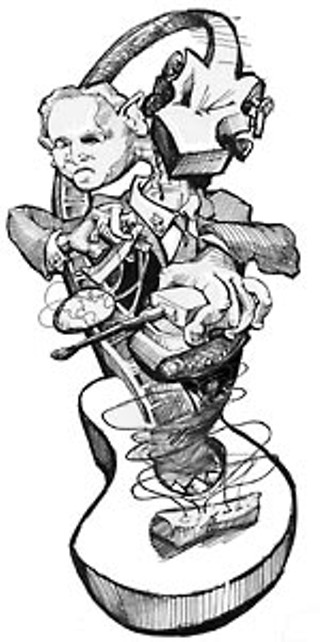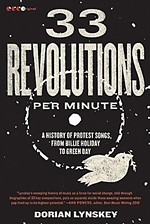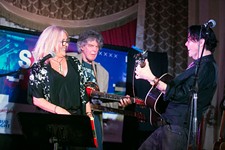The Ballad of Joe Hill
Protest music 2004
By Jim Caligiuri, Fri., Oct. 22, 2004

It's March 2003, approximately a week before the U.S. invasion of Iraq. Bruce Springsteen & the E Street Band take the stage at the Frank Erwin Center with a pounding song that was a hit in 1970, at the height of the Vietnam conflict. "WAR!!! What is it good for? Absolutely nothing!! Say it again!
The crowd roars. The evening's older faction knows the song through Edwin Starr, a second-string Motowner who put his stamp on the Barrett Strong/Norman Whitfield collaboration, and on this night, "War has a special urgency. Weeks earlier, millions of people around the world had taken to the streets in protest of the impending war, but still it seemed inevitable.
A year later, the Boss takes up the activism stick once again. Along with Springsteen, the recently completed Vote for Change tour featured heavyweights R.E.M., Dixie Chicks, Pearl Jam, Bonnie Raitt, and Dave Matthews, along with indie heroes Bright Eyes, Death Cab for Cutie, and My Morning Jacket. Shows were held in the presidential election's so-called swing states, where they could potentially have the most impact. Organized by political action group MoveOnPac.org, its purpose was "to make a change in the direction of our country. ... We are fighting for a government that is open, rational, just, and progressive.
Naturally, this isn't the first time activism has connected with music. Most would point to Joe Hill as the originator of protest songs. Born in Sweden, Hill migrated to the U.S. and in 1910 joined the Industrial Workers of the World ("Wobblies). Over the next half-decade, he campaigned for the causes of the working class. He became a popular songwriter with a gift for capturing the meaning of these causes in song. In 1913, Hill wrote "Should I Ever Be a Soldier, with lyrics that could've been written today: "We're spending billions every year for guns and ammunition. 'Our Army' and 'our Navy' dear, to keep in good condition while millions live in misery, and millions died before us.
In 1914, during bitter struggles over free speech in Utah, Hill was framed for murder. Despite appeals from President Woodrow Wilson and the Swedish government, Hill was executed on Nov. 19, 1915.
Since then, songs of protest have waxed and waned with times of turmoil. Out of the Depression strode Woody Guthrie, who followed in Hill's footsteps, and like-minded folk singers such as Pete Seeger and Leadbelly. The 1960s birthed battles over civil rights and the Vietnam War, and helped forge the careers of Bob Dylan, Phil Ochs, and Joan Baez. The spirit of Joe Hill resonated everywhere, particularly in Country Joe & the Fish's Woodstock anthem, "I Feel Like I'm Fixin' to Die Rag.
"Yeah, come on all of you big strong men, Uncle Sam needs your help again. He's got himself in a terrible jam, way down yonder in Vietnam. So put down your books and pick up a gun, we're gonna have a whole lotta fun.

Then there's Creedence Clearwater Revival's John Fogerty, who wrote "Who'll Stop the Rain and "Fortunate Son as reactions to the Vietnam war. Fogerty reprises that stance on his most recent effort, Deja Vu All Over Again, where the album's title track features these words: "One by one, I see the old ghosts rising, stumblin' 'cross Big Muddy where the light gets dim. Day after day another momma's crying. She's lost her precious child to a war that has no end.
After the success of Guthrie and Dylan, it's generally accepted that political activism is the realm of singer-songwriters. Yet neither man referred to their craft as "protest music. They were doing what songwriters do, writing about what's around them and expressing it in song. Nevertheless, a great deal of the politically conscious songs of our day come from celebrated songwriters of all stripes, from Elvis Costello, Steve Earle, and Patti Smith to Dan Bern, Buddy Miller, and Ani DiFranco.
Earle in particular has become a lightning rod, and seems to enjoy the role. His last album featured a song about the so-called American Taliban, John Walker Lindh, and his latest is titled The Revolution Starts Now. Earle's even begun hosting a talk show on the fledgling, left-leaning radio network Air America.
Since the Sixties there have also been protest songs for specific movements. This was especially obvious during punk's uprising in the UK in the late Seventies and early Eighties, which spawned the Clash; Costello, whose version of Nick Lowe's "(What's So Funny 'Bout) Peace, Love and Understanding has become an anthem; and especially the Special AKA singing "Nelson Mandela. Since punks have always been more or less sociopolitical in nature, it's no surprise Berkeley trio Green Day has issued a rock opera of sorts called American Idiot, which never mentions George W. Bush but doesn't really have to.
There's also the compilation organized by Fat Mike of NOFX titled Rock Against Bush, an idea so popular that a second volume has already been issued. The two collections feature Rancid, Sleater-Kinney, Foo Fighters, Offspring, Alkaline Trio, and No Doubt with the aim of raising funds for PunkVoter.com.
Even with all that, no one expected a tune like "It's a Hit from L.A.'s pop-rockers Rilo Kiley with the vicious opening: "Any chimp can play human for a day. Use his opposable thumbs to iron his uniform and run for office on election day – fancy himself a real decision maker and deploy more troops than salt shakers.
Closer to home there's the Austin-based 13 Ways to Live, which was conceived by a trio of local musicians, keyboardist Bukka Allen, guitarist Robbie Gjersoe, and cellist Brian Standefer, collectively known as Screen Door Music. It's an album of songs performed by a stellar cast, including Alejandro Escovedo, Patty Griffin, Terry Allen, Butch Hancock, Richard Buckner, and Abra Moore. Some of the tracks are personal, some are political, but all were recorded specifically for the project. Standefer proudly notes that money generated from it is being donated to the Nobel Peace Prize-winning Vietnam Veterans of America Foundation and specifically for their program to help victims of the Iraq war.
Perhaps the best of the bunch is Hancock's "The Damage Done, a protest narrative full of wisdom that rivals Dylan when he exclaims, "How we fight for love or money, and how we fight for fun. And how we sometimes fight just to see some damage done. Another standout is Will Sexton's "Whittled by the Wind, a Tom Waits-styled cabaret weeper that allows its composer unexpected emotional punch. Eliza Gilkyson also scores with the rootsy "Highway 9, no surprise since her own superlative album from earlier this year, Land of Milk and Honey, treads similar ground.
Some find it comical that the other side of the aisle is represented by the likes of Wayne Newton, Ted Nugent, Sammy Hagar, Kid Rock, and, of course, the country contingent of Toby Keith, Darryl Worley, Randy Travis, Lee Ann Womack, and Ricky Skaggs. Less comical is the backlash that artists like the Dixie Chicks and Linda Ronstadt received for verbalizing their stand in public. At least their treatment wasn't as harsh as that given once upon a time to students at Kent State, or, in this case, to Joe Hill. ![]()









